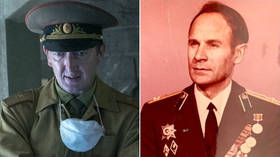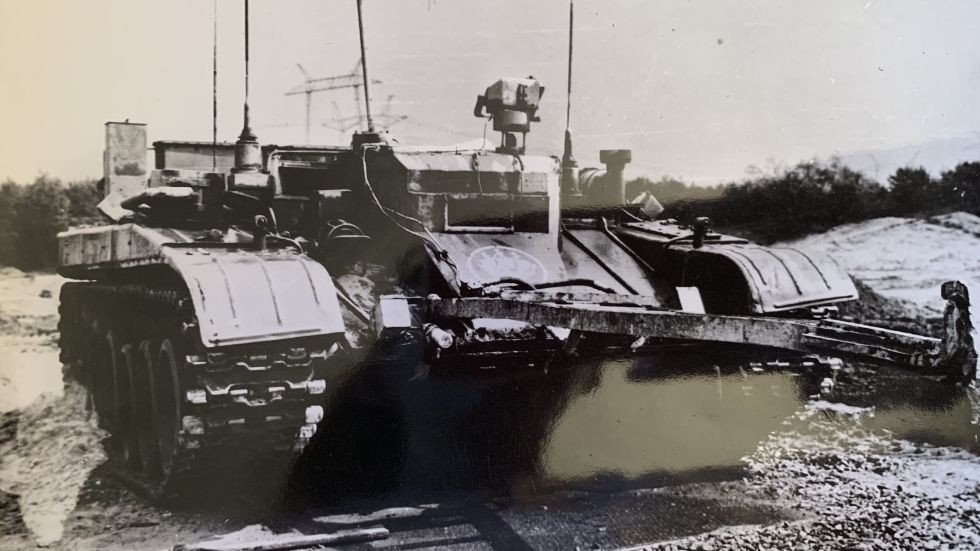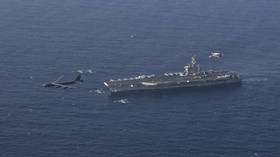What HBO got wrong: Chernobyl general gives hit TV show a reality check

No one told rookie troops to shoot cows in Chernobyl and the miners there never worked naked, Major General Nikolai Tarakanov, who headed the real ‘liquidators’ in 1986, has told RT’s documentary channel.
Tarakanov praised other aspects of the show, adding that the actor who played him in the HBO hit did a “great job.”
Major General Tarakanov was one of the key participants of the events in Chernobyl in 1986, receiving a high dose of radiation while in charge of the troops working to decontaminate the ill-fated power plant.
Major General Tarakanov instructing his troops during the Chernobyl liquidation effort.
Now 85 years old, he has watched the entire new hit miniseries, in which he was portrayed by Scottish actor Ralph Ineson, and commented on its most iconic moments to documentary channel RTD.
Aftermath and liquidation
Nikolai Tarakanov: It was a terrifying sight, really. What on Earth could demolish an entire structure of reinforced concrete? A nuclear bomb? Some massive accident? I couldn't imagine what had happened there. As a result of the explosion, all the rubble and dust was sent into the air. 300,000 cubic meters of soil around the plant were extracted, put in trucks and taken to burial sites. The soil was replaced with 300,000 cubic meters of crushed stone, sealed with concrete and covered with heavy concrete plates. This led to radiation levels falling by hundreds of times around the site, which allowed us to deal with the plant itself and decontaminate the equipment. It’s a long story. But then again, it was the soldiers who did all that. That is why when they ask me about it I always say: yes, there were scientists. Of course there were scientists; I have a doctoral degree myself. But it was the soldiers who were the main heroes of this story. When you think about war history, you always remember the military leaders, great generals, like Zhukov and Voroshilov [top Red Army commanders during WWII]. But who did all the fighting? It was the soldiers.
Soldiers in protective gear working at the Chernobyl nuclear power plant.
RTD: How high were the levels of radiation the soldiers were exposed-to?
Tarakanov: The soldiers who worked under my command, both on the roof and around the plant, could receive an acceptable dose of radiation of 20 rem – the maximum dose permitted during wartime... There were rare cases when people were exposed to higher levels. And that could only happen because of an oversight on the part of any of the commanding officers, or due to a soldier’s own carelessness.
RTD: So, in other words, all soldiers received wartime doses of radiation at a time of peace.
Tarakanov: Yes, that’s true... But, without them, the whole operation would have been impossible.
Just like nuclear war
RTD: So, in essence, having that incident was like having a war on Soviet soil.
Tarakanov: Yes, an actual war – a nuclear war.
RTD: And the disaster lasted for several months.
Tarakanov: Yes.
RTD: It was months before it came to the work you mentioned, like removing layers of soil and decontaminating the area. But before that, we essentially had a nuclear war on our hands – how long did it last?
Tarakanov: I would say from April to December. Right until we repaired and restarted the third reactor, which is next to the fourth one – the one that got destroyed... I myself and other generals and officers each served one-month-long assignments there. Regular soldiers were called in from the army to serve for five months, which I think was unreasonable. Officially, they were called up for reserve training.
Troops involved in liquidation of the Chernobyl nuclear disaster.
Shooting cows & dogs
Tarakanov: There’s this episode [in the HBO series], it’s is an ugly one. They show this boy, a conscript arriving at the military compound. What comes next is just ridiculous. They give him a uniform and moments later they are teaching him how to shoot animals. I mean, that’s just silly. Nothing even close to that ever happened. This is one serious mistake.
RTD: Are you saying they never executed animals, like they show in the episode?
Tarakanov: No, they did, but never in the residential area. In the residential parts, there were no cows, no dogs – not a single one. The shooting did take place, but it was in the forests, where wild animals still roamed, including deer, as well as cattle that wandered off after the evacuation. But to show this young boy, recently drafted, being given all this equipment straight away [is just absurd].
The way it actually happened was pretty simple. The government issued a decree announcing general mobilization. They were supposed to call in 20,000 reservists, as they were called, from, say, Moscow and elsewhere... Those were all men of conscription age, between 30 and 40, mostly. And, of course, they knew nothing about their pending deployment. Later, when they arrived at the base, they were assigned to different units, a platoon, company or battalion. Only then would they set off for Chernobyl. So, all the procedures followed the law. Yet, the time they had to serve there was way too long.
Also on rt.com There WAS a black soldier in Chernobyl, and he is Russian (PHOTOS)Naked miners
RTD: The miners, summoned from all over Russia, including Tula and Donetsk, dug a tunnel underneath the reactor without any machinery, manually removing hundreds of cubic meters of earth that was then taken to burial sites. There is a very dramatic moment in the series when the miners start working naked. Did that actually happen?
Tarakanov: Well, no, I mean – I did not see them naked. I'd say the showrunners took it a bit too far. In fact, this entire operation – it was Academician Velikhov's idea – was unnecessary, but still. They thought that the bottom of the reactor was still extremely hot, because the graphite continued burning, and it burns at 800 degrees... That’s why they had to dig a tunnel underneath and place a concrete slab under the reactor. The idea was to use liquid nitrogen to create a cooling effect, like in a fridge. The concept itself was good, and of course it helped. But it was already September by then.
Miners digging the tunnel under the damaged Chernobyl nuclear power plant reactor.
Keeping locals in the dark
Tarakanov: The commission arrived the day after the explosion, led by [vice-chairman of the USSR’s Council of Ministers] Boris Shcherbina. I knew him very well in person. Valery Legasov [prominent chemist and the chief of the commission investigating the Chernobyl disaster] was there, too, and a whole team of doctors and generals. And yet, instead of taking care of all this, you know, given all the impact, they didn’t even think about the people living here. It took them 36 hours to issue an announcement to the public, and all this time people just went about their daily routines: children went to schools, their parents to work. There was no announcement.

And even those who knew, they asked their teachers in class – ‘Miss, we were told that we should wear protective gear in such cases and stay home, isn’t that right?’ But no one bothered. There were even some weddings that no one knew better to cancel. Fishermen went on fishing. And I believe that Boris Shcherbina is personally responsible for all that – and I say it responsibly as I knew him well, may he rest in peace, he passed away ten years ago. He exposed himself to large doses of radiation, being the head of the government commission.
Gorbachev lacked firm grip
RTD:This series portrays then-Soviet leader Mikhail Gorbachev as a confused man, who is doubting the reality and hesitating to take control. Is that true? Is that how it was and did he really fail to assume responsibility for the incident?
Tarakanov: What I can tell you is that if we speak about the man’s character, since I knew him quite well... he did lack that firm grip on things that, for example, Boris Yeltsin had, the kind that majors and generals have, who can take the lead; issue orders and know what to do, that kind of stuff.
So, when he got the news he didn’t even go there himself, he sent [Nikolai] Ryzhkov [chairman of the Council of Ministers] and Shcherbina to take care of things. And not knowing what’s happening on the ground; not having the slightest idea of what it’s like, he was trying to low-ball the whole thing about the danger to the population and the impact. He was hoping that the commission would report any day that it was all over and fine.
Also on rt.com Gorbachev says he will watch new hit HBO ‘Chernobyl’ showSo the official narrative carefully avoided calling the incident a disaster – which it really was. It was us, the military, who insisted that it should be acknowledged as a disaster. It was one of the century’s biggest man-made disasters.
Legasov’s suicide
Tarakanov: They show Legasov taking part in this meeting [in September 1986]. That couldn’t be further from the truth, as he was at the time in a governmental facility where he [later] made his suicide attempt.
RTD: Why? He felt that he was responsible or he was overwhelmed by the scale of the disaster?
Tarakanov: They ostracized him, I can tell you this straight. Minister Slavsky, whom I knew very well, too, took his name off the list of candidates for the Hero of the USSR award... Then, another thing happened. He went to [Vienna] with a report, and on his return he says we need to create a nuclear safety and security institute... and so they established this institute [but] Velikhov and others did all in their power to leave him without staff. No one wanted to join his team.
WATCH MORE: Chernobyl blast. Valery Legasov's battle
RTD: Why so?
Tarakanov: Who knows? That was the tide at the time, with all the spinning and power games. It came to the point that he couldn’t even get enough votes to be on the scientific council. An outstanding scientist, a star, and they voted him out. And then there was a third factor. His son killed a man in a car accident.
So, [at the end of August 1987] he tried to take his life. My wife worked at the governmental hospital at the time. They saved his life, brought him back. But [mere months later] he [took his own life] anyway, you see.
Also on rt.com 'Chernobyl' is a blast of a TV series – but don’t call it ‘authentic’‘Biorobots’
RTD: The series shows you acknowledging that even the military taking part in the operation were kept in the dark about the real radiation levels and the true scale of the disaster, is that true?
Tarakanov: No, that’s complete nonsense, because I can tell you everything. At that session, where [Yury] Samoylenko [deputy Chief Engineer at the Chernobyl nuclear station] was reporting to Shcherbina and the commission that the robots malfunctioned and that there were still huge radiation levels on the roofs of the first, second and third nuclear power units and around the power plant, and Shcherbina was so depressed and frustrated, and he said, so what do we do now without the robots? And then someone, I cannot now recall, who it was exactly, he said, our only option is biorobots. But I knew immediately he meant soldiers, I knew it...
RTD: In the series, this comes from Legasov.
Tarakanov: Who wasn’t even there!
RTD:So, at that point it became clear that it was impossible to avoid human involvement.
Tarakanov: Yes.
RTD: And that was the second major operation of this kind.
The omitted speech
Tarakanov: [The actor who played me in the series] did such a great job, so well done. I completely loved the actor and his portrayal. Even I believed he was a general for real. Of course, the ending in the series is a bit different from what it was in reality. I was presenting the soldiers and officers with awards. So I was there, addressing my battalion, they are standing in line, and that’s OK in the series. But then one thing is not there – my address to the soldiers:
‘Dear brothers-in-arms, our people are grieving every day as they have to continue hearing the reports of Chernobyl still remaining the source of deadly radiation that threatens the entire planet. It is up to us now to put an end to this and contain the threat. It is true, and I can confirm it to you, that you have been assigned this task by the Ministry of Defense. Nonetheless, you have to volunteer. Anyone of you is free to step out of this line and be reassigned elsewhere. I give you one minute and I guarantee there will be no repercussions, because it is your life, and I’m responsible for your lives.’
Also on rt.com ‘Terrifying sight’: General portrayed in HBO’s ‘Chernobyl’ shares what disaster was really likeRemoving radioactive material
Tarakanov: Of course, it was much more complicated in reality. After the group of five were instructed, an officer would take the soldiers to the site. An accompanying officer. He would take them to the gaping hole in the roof of the nuclear power unit... Their task was to climb the stairs and grab a sledge hammer. A routing officer would stand at the bottom of the stairs, operating two buttons – one to run a stopwatch, and the other to launch a siren.
So, as soon as the soldiers reached the top of the stairs, sledge hammers in hand, ready to accomplish the task that I or my assistant had given them, the officer would start the stopwatch. Five minutes later he would hit the siren button. The siren was so loud that everyone in Chernobyl heard it. But the soldiers didn’t even wince, after hours of preliminary training... So they would come down the stairs and hand their individual radiation dosimeters over.
Dimitrov, a professor from the Obninsk nuclear power plant, would take readings with his device to measure their exposure levels. Say, 18 rem...15... He kept a record of the numbers. And then he would say: ok, 18, free to go.
Also on rt.com Chernobyl 30 years on: Reliving horror of world’s worst nuclear accidentRTD: It had to be below 20 rem, right?
Tarakanov: Yes, of course. There were some cases when people got exposed to higher levels, but they were very few.
RTD: How many rooftop missions per soldier are we talking about?
Tarakanov: Only one was mandatory. But some volunteered to go twice or even three times. I recall sergeant Cheban. The first time he got 8 rem, the second time 15. He earned five thousand rubles for each. But he did not do it for the money. He wanted to prove he could do it.
There was another guy, Stepanov, if my memory serves me right. He is in elevator maintenance now. He made three trips to the roof. A very strong man. He is still very strong. It all depends on your health.
In each case, before they could go again, they had to undergo all medical checks at the field hospital. There was a very thorough control system in place, and all regiment and battalion commanders were personally responsible for each soldier’s life. And I, Major General Tarakanov, was responsible for the radiation exposure of each and every soldier, too.
Watch the interview in Russian on RT's Documentary Channel.
Think your friends would be interested? Share this story!













